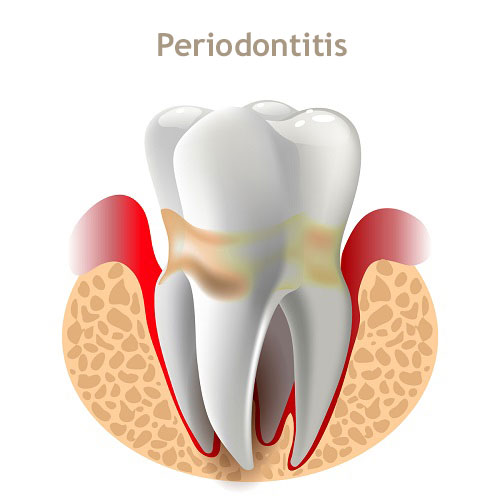What is Periodontal (Gum) Disease?
Periodontal, or gum, disease is a common inflammatory condition around an individual’s teeth that can weaken the supporting soft tissue and bone around each tooth. In its most advanced stages, periodontitis can also result in major damage to the jawbone itself.
The most common precursor to periodontal disease is gingivitis – a bacterial infection affecting the gum tissue. Gingivitis is caused by plaque, which contains toxins that are released into the gums, irritating and inflaming the surrounding tissue. The bacterial infection then begins to settle deep into the gum pockets between teeth, making the infection more difficult to reach and treat. If left untreated, this progressive infection can lead to the deterioration of the connective tissue and jawbone, as well as shifting or lost teeth.
Periodontal disease is the number one cause of adult tooth loss in the developed world. When treated promptly, tooth loss and further damage can be effectively mitigated.
Stages of Periodontal Gum Disease
Understanding the Stages of Gum Disease
Types of Periodontal Disease
Gingivitis is a mild gum inflammation and non-destructive form of periodontal disease. If left untreated, the infection can spread beneath the gum line and cause severe damage. Once the gums are irritated by the toxins from the plaque buildup, the body’s natural response to this chronic inflammatory condition is to break down and destroy its own bone and soft tissue. Teeth begin to separate slowly from the infected gum issues, creating deeper and deeper pockets between the gums and teeth. This tooth separation is usually indicative of periodontal disease.
Chronic periodontitis
This is the most common form of periodontal disease. Chronic periodontitis is characterized by deep pockets between teeth, gum (gingival) recession, and loss of tissue attachment, which are all caused by tissue inflammation.
Aggressive periodontitis
This type of periodontal disease can occur in an otherwise clinically healthy individual. Like its namesake, aggressive periodontitis progresses rapidly and aggressively, causing gum detachment, chronic bone destruction and familial aggregation.
Necrotizing periodontitis
This form of gum disease is common in individuals who suffer from systemic conditions like HIV, immunosuppression and malnutrition. Necrosis, or “tissue death”, occurs in the periodontal ligament, alveolar bone and gum tissue
Periodontitis caused by systemic disease
This type of gum disease is typically onset at a young age and is typically associated with medical conditions, such as respiratory disease, diabetes and heart disease.

Can't Call Us Now?
Complete the form below and a member of our team will contact you at a more convenient time!








